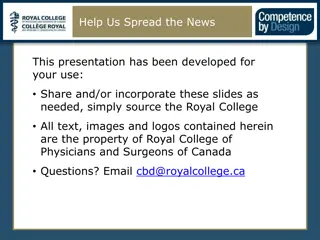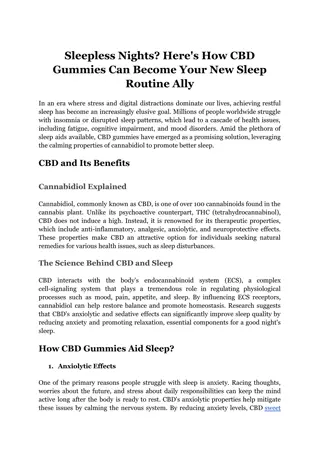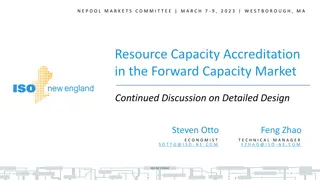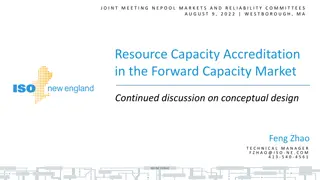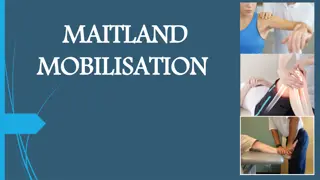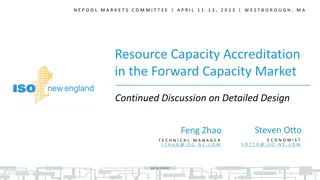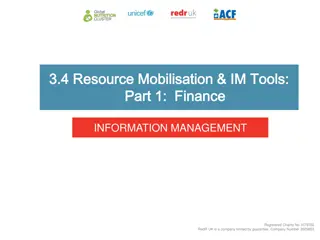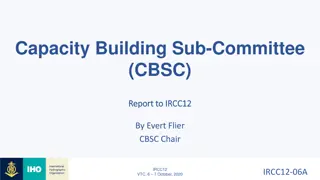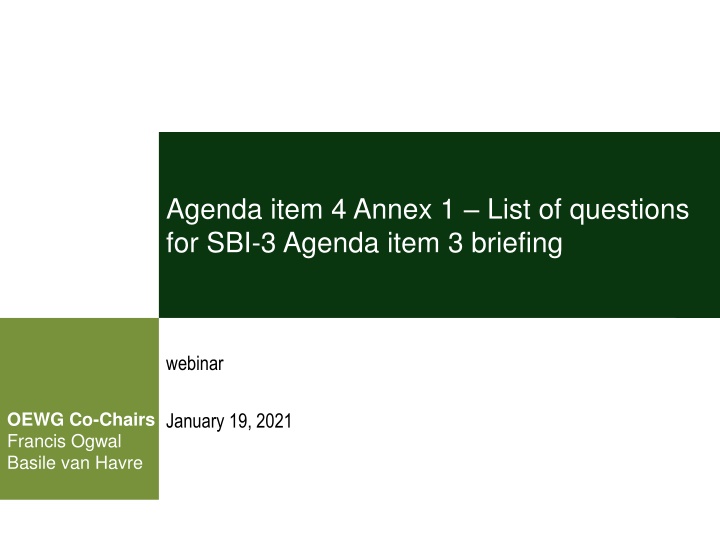
List of Questions for SBI-3 Agenda - Resource Mobilisation, Capacity Building, CBD Post-2020
This collection includes a list of questions for SBI-3 agenda items, focusing on resource mobilisation, capacity building, and the CBD Post-2020 process. The questions cover various aspects such as costs, savings, funding sources, national finance plans, capacity-building strategies, knowledge management, technical cooperation, and innovation support. Explore key insights and considerations for effective implementation and development in the biodiversity framework.
Download Presentation

Please find below an Image/Link to download the presentation.
The content on the website is provided AS IS for your information and personal use only. It may not be sold, licensed, or shared on other websites without obtaining consent from the author. If you encounter any issues during the download, it is possible that the publisher has removed the file from their server.
You are allowed to download the files provided on this website for personal or commercial use, subject to the condition that they are used lawfully. All files are the property of their respective owners.
The content on the website is provided AS IS for your information and personal use only. It may not be sold, licensed, or shared on other websites without obtaining consent from the author.
E N D
Presentation Transcript
Agenda item 4 Annex 1 List of questions for SBI-3 Agenda item 3 briefing webinar OEWG Co-Chairs Francis Ogwal Basile van Havre January 19, 2021 October 2019
Rationale & Use of Questions Annex Most SBI agenda items have links to GBF Yet all also have their own link to CoP15 outside of GBF Need to be efficient: Single discussion on each issue to cover both requirements Need to ensure SBI understands specific needs for GBF Creation of a list of questions from GBF to SBI To be used as checklist during whole SBI agenda item Request: Consider questions during your discussion Outcome: cross reference outcomes of various agenda items with list of questions CBD Post 2020 Process 2
Agenda item 6 - resource mobilisation 1.1 Need 1.1.1. cost of implementing the post-2020 global biodiversity framework. 1.1.2. costs of inaction. 1.2 Savings 1.2. savings which can be achieved through effective and coherent action. 1.3.1. resources that can be generated by repurposing existing subsidies and incentives. 1.3.2. other sources of funds (e.g. philanthropy). 1.3.3. indirect source of funding (e.g. business spending). 1.3. Source of funds (Article 20) 1.3.4. national budgets. Should this be captured in national budgets, national financial plans (e.g. like the unconditional commitments under the United Nations Framework Convention on Climate Change)? 1.3.5. official development assistance. 1.3.6. What is the role of the Global Environment Facility (GEF) (Article 21)? How could GEF expedite access to funds, with minimal delays, to support timely implementation of the post-2020 global biodiversity framework by least developed countries, small island developing States and countries with economies in transition? 1.3.7. role of other funds (e.g. Green Climate Fund) and how to leverage these. What is the potential overlap between the Convention and these other funds? Should new funding windows be developed or established, as was the case for the United Nations Framework Convention on Climate Change? 1.4.1. level of detail? Should plans address each target? CBD Post 2020 Process 1.4 National Fianace plan biodiviersity 1.4.2. mandatory? Should the national biodiversity finance plans be merged with national plans? 1.4.3. What is the role of financial plans for other processes, such as climate change, in addressing biodiversity issues? 3
Agenda item 7 capacity building 2. Capacity-building 2.1. Is a global capacity-building strategy the best tool to achieve result for capacity-building and development? and development 2.2. How are national conditions and needs determined and communicated? Should this be done through the national plans? 3.1. What processes are needed for traditional knowledge? 3. Knowledge management and sharing generation 3.2. What processes are needed to further support the development of biodiversity information and knowledge? 4.1. How should technical and scientific cooperation, technology transfer and innovation encouraged and supported? What is the role of cooperation between developing country Parties and of cooperation between developing country Parties supported by developed country Parties and other partners? technology transfer 4. Technical and and innovation cooperation, scientific CBD Post 2020 Process 4
Agenda item 9 transparency and responsibility 5.1.1. How is transparency and the responsibility of all stakeholders ensured? 5.1.2. other United Nations conventions report? questions 5.1. General 5.1.3. How do businesses report? 5.1.4. How do subnational governments report? Is this through their national Governments? 5.2.1. Are NBSAPs the basis for the national plans? What is the instrument to communicate national commitments and action plans to the Convention? What is the role of NBSAPs in this? How often and when are national plans updated? 5.2.2. Are changes to the NBSAPs needed? 5.2.3. If NBSAPs are to be updated, how do we ensure that financial support is available in a timely manner? 5.2.4. Must NBSAPs include all relevant targets from the post-2020 global biodiversity framework and, if so, how do we ensure this and who decides what is relevant? 5.2.5. Must NBSAPs reflect all headline indicators? Can countries use their own national indicators or only indicators agreed by the Conference of the Parties? Planning CBD Post 2020 Process 5.2.6. Do Parties have the necessary capacity and resources to report on mandatory indicators? 5.2.7. How can we ensure that NBSAPs are developed expediently? What is the time frame for minimizing delays in the implementation of the post-2020 global biodiversity framework at the national level? 5.2.8. How can benefits (synergies) from the coordination and integration with other plans, coordination be realized? 5.2. 5
Agenda item 9 transparency and responsibility 5.3.1.1. What is the process/modalities for national reporting (i.e. some rapid concise report more frequently and/or more infrequent comprehensive reports)? Should the current reporting period for the Convention on Biological Diversity be maintained? 5.3.1.2. How should countries report on their commitments/actions listed in their national plans? Should reports cover all actions and commitments or a subset? 5.3.1.3. Should different types of information be reported at different times or frequencies (i.e. interim report in between full reports)? 5.3.1.4. How do we ensure that reports are provided according to the agreed schedule? 5.3.1.5. How do we ensure adequate and timely financial support is available for developing countries, including the least developed countries and small island developing States, to support the preparation of national reports? 5.3.1.6. How could the reports for different processes be harmonized, synchronized or even integrated (including for the Convention and Cartagena and Nagoya Protocols)? 5.3.1 ational 5.3 Reporting 5.3.2.1. What is the role of the Intergovernmental Science-Policy Platform on Biodiversity and Ecosystem Services (IPBES) and the Global Biodiversity Outlook in the global reporting system? What are the gaps and overlaps of these? What is the value of the Global Biodiversity Outlook? How can efficiency be improved? 5.3.2 Global CBD Post 2020 Process 5.4.1. How do we ensure that the review system ensures learning, transparency and adaptation? National Global 5.4.2. Should national reports be reviewed for their conformity to guidelines agreed by the Conference of the Parties and if so what are the modalities for this and who should undertake the review? 5.4.1 5. 4 Review 5.5.1. What kind of data should be used and what is the role of data collected by non-State actors (e.g. remote sensing)? What are the modalities for data collection for the global stocktake? 5.4.2 6
Thank You UN BIODIVERSITY CONFERENCE UN BIODIVERSITY CONFERENCE COP 15 CP/MOP10-NP/MOP4 Ecological Civilization-Building a Shared Future for All Life on Earth CBD Post 2020 Process 2021 KUNMING CHINA #Post2020 #Nature





